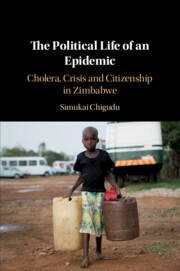Book contents
- The Political Life of an Epidemic
- The Political Life of an Epidemic
- Copyright page
- Dedication
- Contents
- Figures
- Table
- Preface
- Abbreviations
- Map of Zimbabwe
- Introduction
- 1 The Making of Urban (Dis)Order
- 2 ‘When People Eat Shit’
- 3 Emergency Politics
- 4 The Salvation Agenda
- 5 ‘People Were Dying Like Flies’
- Conclusion
- References
- Index
5 - ‘People Were Dying Like Flies’
The Social Contours of Cholera in Harare’s High-Density Townships
Published online by Cambridge University Press: 10 January 2020
- The Political Life of an Epidemic
- The Political Life of an Epidemic
- Copyright page
- Dedication
- Contents
- Figures
- Table
- Preface
- Abbreviations
- Map of Zimbabwe
- Introduction
- 1 The Making of Urban (Dis)Order
- 2 ‘When People Eat Shit’
- 3 Emergency Politics
- 4 The Salvation Agenda
- 5 ‘People Were Dying Like Flies’
- Conclusion
- References
- Index
Summary
This chapter focuses on the views of residents in the townships where the epidemic first fulminated. My interviewees in this portion of society describe the ZANU(PF) regime in sinister terms – as an entity capable and willing to inflict harm on them through a ferocious disease or to ignore them in times of desperate need. Thus, cholera made clear just how marginalised they are in Zimbabwean society. My interlocutors recounted stories of relentless suffering, violence, dispossession and abandonment during the cholera outbreak. It is tempting to read this grim narration as a form of victimhood when faced with a sinister political regime and a deadly disease outbreak. But to do so would be to grasp only one aspect of what are layered public narratives. By examining the ways in which people spoke about cholera, I underscore the limitations that ‘the state’ has in commanding its own discursive representations and in shaping popular understandings of a political disaster. While my interlocutors speak from an apparent position of victimhood, the outbreak also provided an occasion for township residents to vent their outrage at the government and demand better-quality, more accountable public service delivery. These were important claims to substantive forms of citizenship.
Keywords
- Type
- Chapter
- Information
- The Political Life of an EpidemicCholera, Crisis and Citizenship in Zimbabwe, pp. 155 - 183Publisher: Cambridge University PressPrint publication year: 2020



